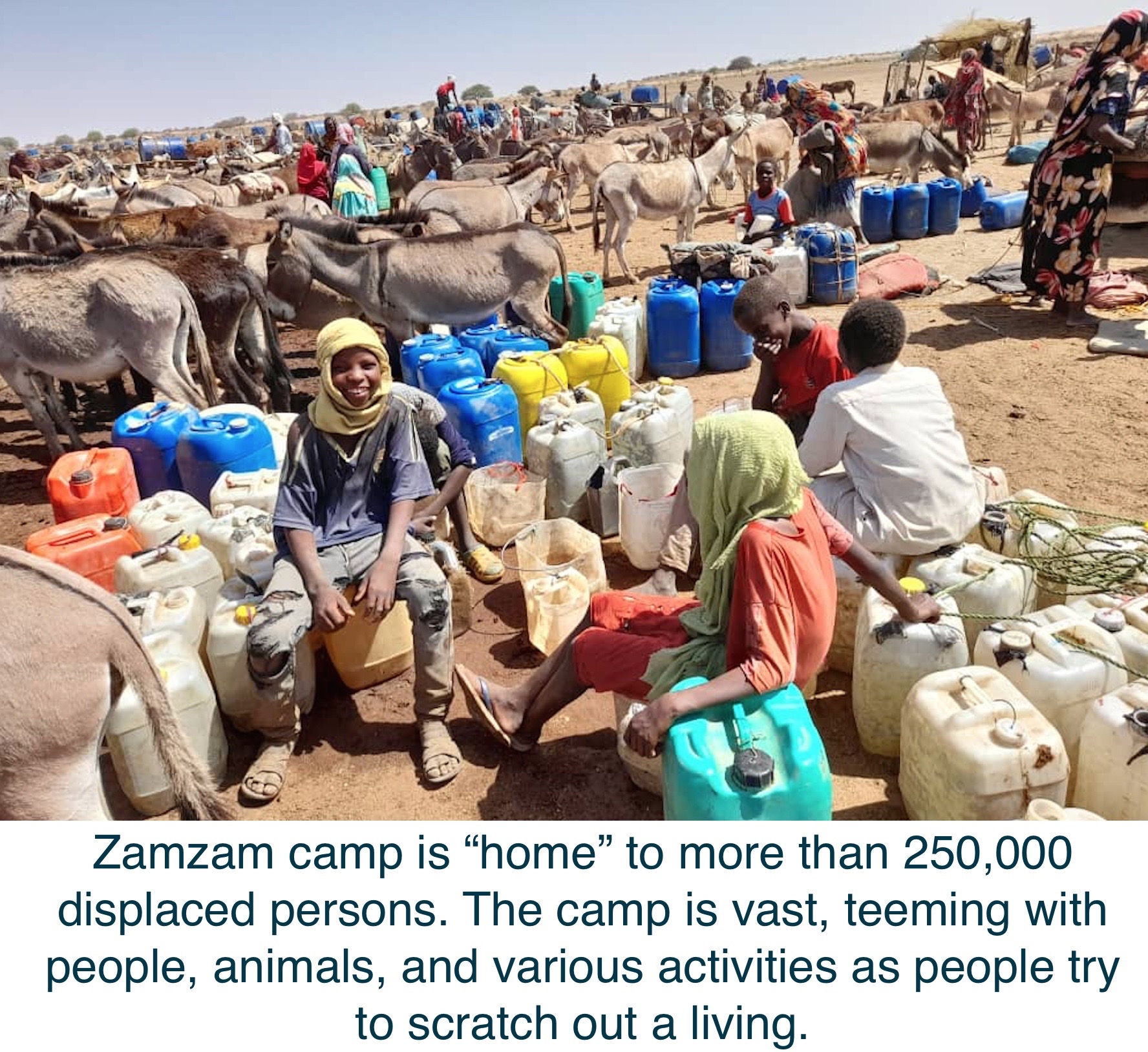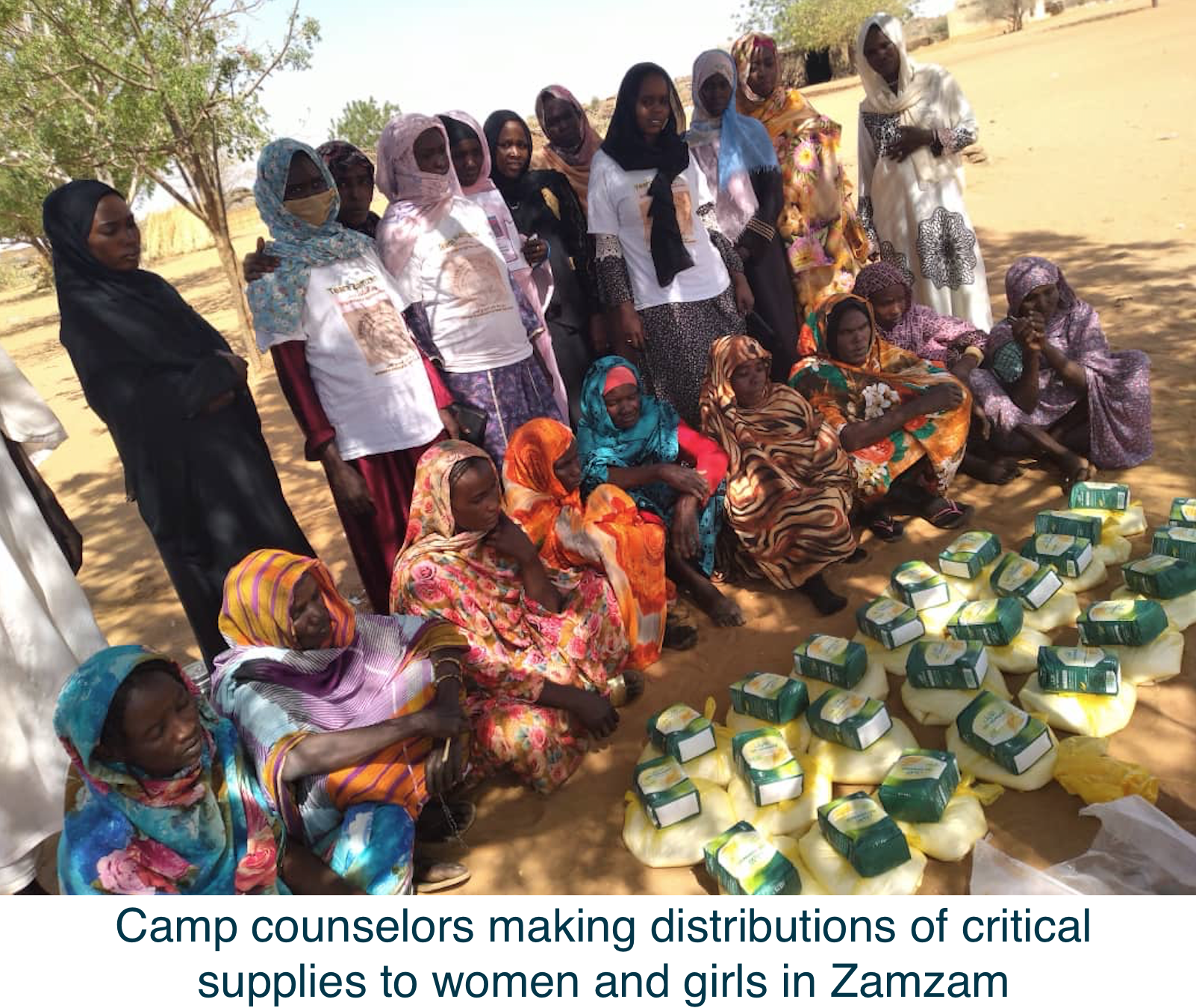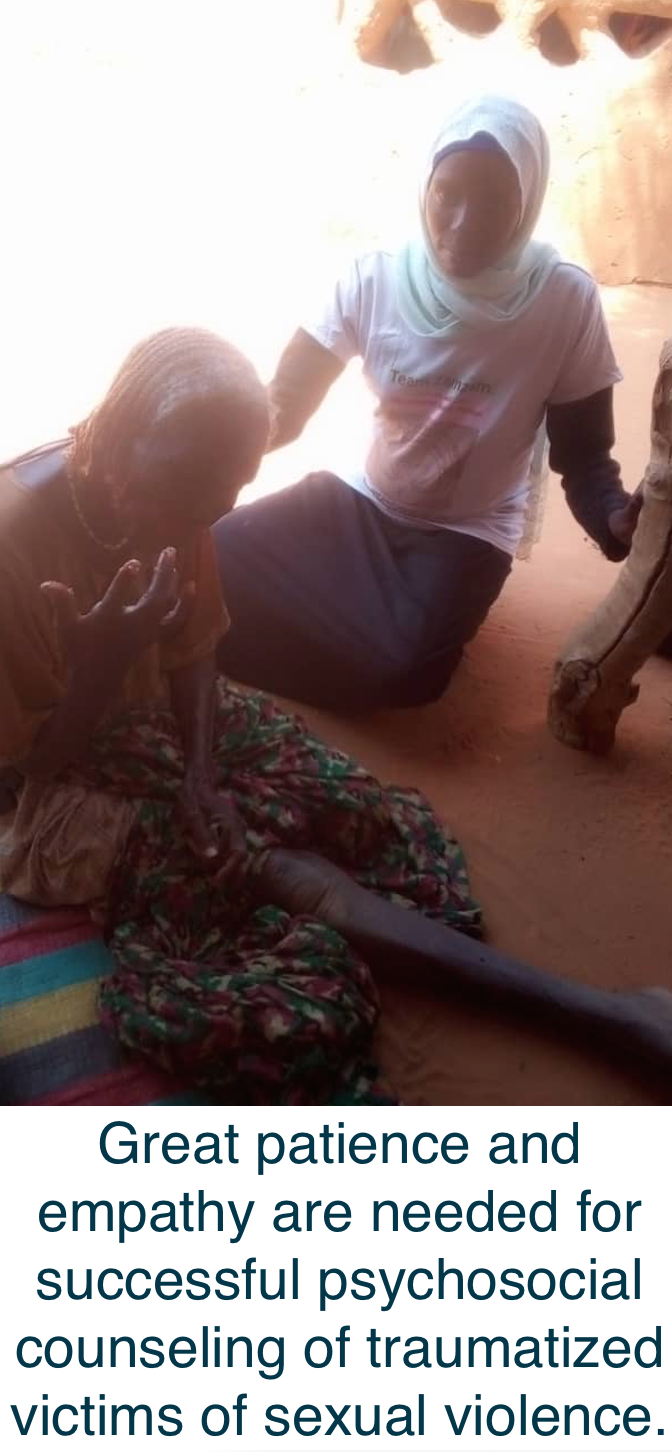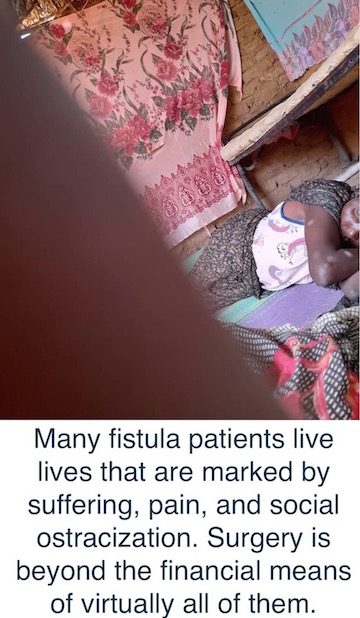Gaffar Mohammud Saeneen and Eric Reeves, Co-Chairs
Julie Darcq, Online Campaign Coordinator
Overview (Eric Reeves)
Our project in Zamzam IDP camp (North Darfur) was recently highlighted in Radio Dabanga, the most important source of news in English about developments in Darfur. It provided a lengthy and highly informed overview of what we have achieved to date and hope to achieve in the future.
One feature of the project that was not highlighted—it is already impossible to provide a full account of what we have achieved in a format and length that is appropriate for publication—is the role of our monthly distribution of funds in providing livelihoods for many women formerly without employment (which continues at staggering levels throughout Sudan—especially in Darfur, and especially for women and girls). My colleague Gaffar recently forwarded to me from Zamzam IDP camp one account of a counselor that seems to me especially telling:
One of our counselors who is widowed by war and left with four children to raise on her own said:
“Gaffar, six month ago before I started working with you on this project, my life was miserable, my kids were constantly hungry, and always short of basic nutrition. My best friends from childhood days, when they saw me coming, ran away to avoid me. I was on the verge of breakdown from psychological stress. My life was hell; back then I was sleepless at night and in the day I wandered around on the street of El-Fasher looking for a job to buy daily nutrition for my kids. I looked for anything, from cleaning to washing clothes. But being a woman, things aren’t that easy here—in Darfur in particular. When you ask people for a job they laugh at you and look at you in a way that makes you feel like you want to cry.
“But thank god and thank you, I will not cry anymore. I’m stronger because of this project and my kids are happier than ever I imagined in my entire life. The strength and the sense of self-dependency which I gained from this project is something indescribable in a few lines or paragraphs, but it’s rather something extraordinary, which I carry on with me to empower others—and all of my colleagues feel alike. All of us feel very positive and openly talk about our future, aspirations and dreams optimistically.”
In other words, our project not only provides critical counseling and assistance to those traumatized and physically injured by sexual violence, but provides employment that is at once deeply rewarding and allows the counselors to feed their families. Hard currency is then circulated within the grim but still active economies of Zamzam and El Fasher, stimulating economic activity—thus increasing various forms of production and creating yet more employment opportunities. This catalytic effect of our project is, I believe, a model for much larger humanitarian enterprises.
Other Ways of Helping the People of Zamzam and Surrounding Rural Areas
Counselors continue to provide basic essentials to those most in need: the disabled, the very elderly, widows with children. There has been a continuous distribution of sanitizing soap (now totaling thousands of bars) as well hundreds of feminine hygiene kits, along with essential medicine when available (especially antibiotics). The counselors have also distributed masks as well as advice on prophylactic measures as Covid-19 begins its deeply ominous resurgence in Sudan (there have very recently been many reported deaths in Zamzam from a mysterious fever, likely Covid-19). In this respect, Zamzam IDP camp is at acute risk, for even with a very large “footprint” it houses more than 250,000 displaced persons according the 90+ omdas (senior tribal leaders) who provide civilian governance in the camp. Overcrowding makes social distancing impossible, and there is much more work to be done in the provision of masks and materials to be sewn into masks.
Between May 1 and May 12 (during Ramadan) the following basic necessities were distributed by counselors in Zamzam and rural areas to the most needy; they called them “Eid Packages,” consisting of sugar, flour, pasta—and dates, the latter for for Eid al-Fitr, marking the end of the fasting month of Ramadan:
43 families in Dar El Naiem
81 families in Zamzam camp
These went to:
11 families caring for people with disabilities, the handicapped, and mentally disabled
6 families caring for blind person.
28 families comprising mothers caring for orphans
23 families caring for very elderly people
58 families severely impoverished
The counselors also distributed:
36 boxes contained women’s cotton, toothpaste, shaving razors and shaving creams.
Supplies of Infliximab pills (antibiotics for urinary tract infections
Drawing supplies for art therapy
Grim Realities Persist
Sexual violence as reported by the counselors in Zamzam camp continues at an alarming, indeed terrifying rate, and this is almost certain to grow during the planting season now underway and again during the fall harvest season. The nature of the sexual violence is particularly brutal, leaving girls and women both psychologically traumatized and physically in acute distress.
In response, we are now committed to four fistula surgeries for the month of June, to increase to five per month in July.
The importance of medical intervention is clear from many narrative accounts given to the counselors. One of our fistula patients of the past month was 29-year-old Howa Y., who reported:
“For three years I had too much pain. Sometimes the pain is so intense to the degree that I lost control of myself and felt sick. This prevented me from doing small things, like cooking, washing my clothes, and engaging in daily activities. But praise be to Allah, for now I go to my farm this season feeling happy. I have nothing to pay for those who helped me to gain relief from my pain, but I will pray for Allah to award them for their deeds and bless them with health and more prosperity for their kindness and support.”
But the need for fistula reparative surgery is greater than our resources. Priority is given to those who suffer most and who seem likely candidates for successful surgery. Choosing only four for surgery will be exceedingly difficult, although some choices are utterly compelling. On May 19, the coordinating counselor wrote:
“Mariam Abdulrahman A., 36 years of age, is from the village of Umm Hashaba in North Darfur. Mariam was raped in front of her five-year-old son and 9- and 7-year-old daughters while she was on her farm during rain fall season of 2019 and since then she has been suffering from unknown illness, but the counselors think it could be fistula.
“Mariam said, ‘Since that bad day on our farm, pain in my genital area has not gone away; especially when weather gets humid, the pain increases and it irritates me to the point where I can’t sleep for several days. Last year one doctor in our local area, in Abu Zereiga, said that my ‘gentle’ is badly infected and advised me to seek urgent medical treatment in El Fasher; but I didn’t go there because I cannot afford it. This unbearable pain is forcing me sometimes to think about suicide and wishes for a sudden death, even as this type of thinking is itself an unforgivable offence against will of almighty Allah.’
“Mariam is now on the priority list for June for treatment in El Fasher on an urgent basis.”
Most of the work of Team Zamzam continues to be in providing counseling care to victims of sexual violence, many of whom have never spoken to anyone about their traumatizing experiences. An overview of the figures for counseling sessions in May hardly does justice to the time and care with which individual and group sessions are conducted. (For a brief compendium of testimonials from girls and women who have received counseling, see here.)
Through May 22, there were:
171 individual counseling sessions in Zamzam camp and in the Dar al-Naim rural area
75 group counseling sessions in Zamzam camp and in the Dar al-Naim rural area
And yet the number of victims only grows. The coordinating counselor reported on an assessment mission in late May:
“Gaffar, things are frightening here, and the stories of girls and women are shockingly horrible. I can’t believe I’m hearing and witnessing this before my eyes. There are perhaps hundreds of recent victims in this area alone. We came here for three days but the way I see things here we may extend our duration until next week to get engaged on counseling sessions.”
Again, June is the heart of planting season, and there is clear evidence that those returning to their farms—in the North Darfur areas around El Fasher, and indeed all of Darfur—will face extreme insecurity and sexual violence of the brutal sort that has defined ethnically-targeted violence since the beginning of the Darfur genocide. Despite the dangers, the annual migration from the camps back to farmlands, even those that have been seized by Arab camel herders, is well underway—and the nominally “civilian” government of Prime Minister Hamdok seems to be continually surrendering power to the military and militia elements of the “Sovereign Council.”
The work of Team Zamzam is as urgent as ever.
For a detailed account of what has been achieved in the past month, as well as further narrative context for the work being done, see this Annex:
(Previous updates are archived at: https://www.ericreeves-woodturner.com/blog/ )
(To provide help for our project, see | https://www.ericreeves-woodturner.com/gallery/ )




